 Operation and Maintenance
Operation and Maintenance
 Linux Operation and Maintenance
Linux Operation and Maintenance
 What is the command to check the size of a folder in Linux?
What is the command to check the size of a folder in Linux?
What is the command to check the size of a folder in Linux?
The Linux command to check the size of a folder is du. du is a command that counts the disk space occupied by a directory or file. The syntax is "du [option] [directory or file name]"; to view the size of each file or folder in the current directory, execute "du -h –max-depth= 1 *", to query the total size of the current directory, execute "du -sh", to view the total size of the specified directory, execute "du -sh directory name".

#The operating environment of this tutorial: linux7.3 system, Dell G3 computer.
The Linux command to check the size of a folder is du.
du is a command that counts the disk space occupied by a directory or file.
When we count directories, we don’t want to see how much space the subdirectory names and subfile names under the parent directory occupy, but we want to see the total disk usage of the subdirectories and subfiles under the parent directory. At this time, you need to use the du command to count the real disk usage of the directory. The format of the
du command is as follows:
du [选项] [目录或文件名]
Options:
-a: Display the disk for each subfile Occupancy. By default, only the disk usage of subdirectories is counted-h: Use custom units to display disk usage, such as KB, MB or GB;-s: Count the total disk usage without listing the disk usage of subdirectories and subfiles
Through the commanddu -h –max-depth=1 *, you can check the size of each file and folder in the current directory, this is more practical.
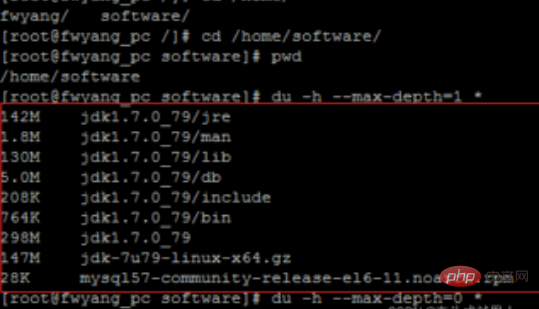
To query the total size of the current directory, you can use du -sh, where s represents the meaning of statistical summary, that is, only one total size is output.
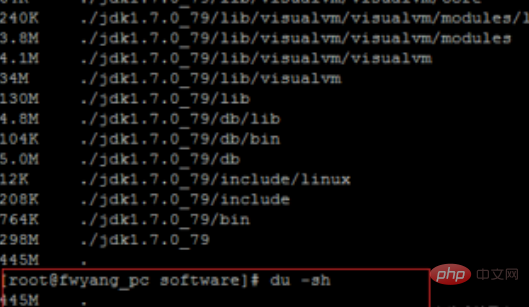
Use the command du -h –max-depth=0 * to display only direct subdirectory file and folder size statistics.
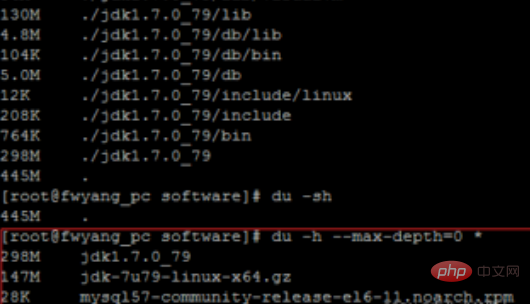
If you only want to view the total size of the specified directory, you can use du -sh directory name.
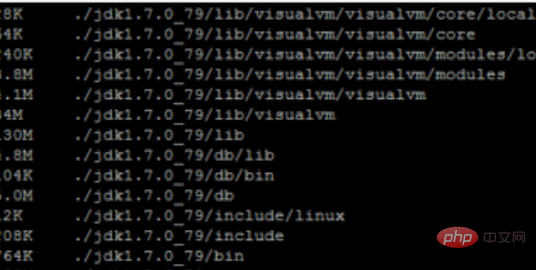
You can also specify the display level depth for a specified folder, such as du -h --max-depth=0 software/ and du -h --max-depth=1 software/
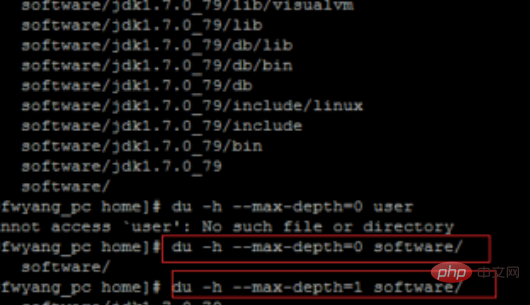
##Extended knowledge: the difference between du command and df command
Sometimes we will find that when using the du command and the df command to count partition usage, the data obtained are different. That's because the df command is considered from the perspective of the file system and uses the unallocated space in the file system to determine the amount of space that has been allocated in the file system. That is to say, when using the df command to count partitions, not only the space occupied by files must be considered, but also the space occupied by commands or programs (the most common one is that the files have been deleted, but the program has not released the space). The du command is file-oriented and will only calculate the disk space occupied by files or directories. In other words, the partitions counted by the df command are more accurate and are real free space. Recommended learning:The above is the detailed content of What is the command to check the size of a folder in Linux?. For more information, please follow other related articles on the PHP Chinese website!

Hot AI Tools

Undresser.AI Undress
AI-powered app for creating realistic nude photos

AI Clothes Remover
Online AI tool for removing clothes from photos.

Undress AI Tool
Undress images for free

Clothoff.io
AI clothes remover

Video Face Swap
Swap faces in any video effortlessly with our completely free AI face swap tool!

Hot Article

Hot Tools

Notepad++7.3.1
Easy-to-use and free code editor

SublimeText3 Chinese version
Chinese version, very easy to use

Zend Studio 13.0.1
Powerful PHP integrated development environment

Dreamweaver CS6
Visual web development tools

SublimeText3 Mac version
God-level code editing software (SublimeText3)

Hot Topics
 1652
1652
 14
14
 1413
1413
 52
52
 1304
1304
 25
25
 1251
1251
 29
29
 1224
1224
 24
24
 What computer configuration is required for vscode
Apr 15, 2025 pm 09:48 PM
What computer configuration is required for vscode
Apr 15, 2025 pm 09:48 PM
VS Code system requirements: Operating system: Windows 10 and above, macOS 10.12 and above, Linux distribution processor: minimum 1.6 GHz, recommended 2.0 GHz and above memory: minimum 512 MB, recommended 4 GB and above storage space: minimum 250 MB, recommended 1 GB and above other requirements: stable network connection, Xorg/Wayland (Linux)
 Linux Architecture: Unveiling the 5 Basic Components
Apr 20, 2025 am 12:04 AM
Linux Architecture: Unveiling the 5 Basic Components
Apr 20, 2025 am 12:04 AM
The five basic components of the Linux system are: 1. Kernel, 2. System library, 3. System utilities, 4. Graphical user interface, 5. Applications. The kernel manages hardware resources, the system library provides precompiled functions, system utilities are used for system management, the GUI provides visual interaction, and applications use these components to implement functions.
 vscode terminal usage tutorial
Apr 15, 2025 pm 10:09 PM
vscode terminal usage tutorial
Apr 15, 2025 pm 10:09 PM
vscode built-in terminal is a development tool that allows running commands and scripts within the editor to simplify the development process. How to use vscode terminal: Open the terminal with the shortcut key (Ctrl/Cmd). Enter a command or run the script. Use hotkeys (such as Ctrl L to clear the terminal). Change the working directory (such as the cd command). Advanced features include debug mode, automatic code snippet completion, and interactive command history.
 Where to write code in vscode
Apr 15, 2025 pm 09:54 PM
Where to write code in vscode
Apr 15, 2025 pm 09:54 PM
Writing code in Visual Studio Code (VSCode) is simple and easy to use. Just install VSCode, create a project, select a language, create a file, write code, save and run it. The advantages of VSCode include cross-platform, free and open source, powerful features, rich extensions, and lightweight and fast.
 How to check the warehouse address of git
Apr 17, 2025 pm 01:54 PM
How to check the warehouse address of git
Apr 17, 2025 pm 01:54 PM
To view the Git repository address, perform the following steps: 1. Open the command line and navigate to the repository directory; 2. Run the "git remote -v" command; 3. View the repository name in the output and its corresponding address.
 How to run java code in notepad
Apr 16, 2025 pm 07:39 PM
How to run java code in notepad
Apr 16, 2025 pm 07:39 PM
Although Notepad cannot run Java code directly, it can be achieved by using other tools: using the command line compiler (javac) to generate a bytecode file (filename.class). Use the Java interpreter (java) to interpret bytecode, execute the code, and output the result.
 What is the main purpose of Linux?
Apr 16, 2025 am 12:19 AM
What is the main purpose of Linux?
Apr 16, 2025 am 12:19 AM
The main uses of Linux include: 1. Server operating system, 2. Embedded system, 3. Desktop operating system, 4. Development and testing environment. Linux excels in these areas, providing stability, security and efficient development tools.
 How to run sublime after writing the code
Apr 16, 2025 am 08:51 AM
How to run sublime after writing the code
Apr 16, 2025 am 08:51 AM
There are six ways to run code in Sublime: through hotkeys, menus, build systems, command lines, set default build systems, and custom build commands, and run individual files/projects by right-clicking on projects/files. The build system availability depends on the installation of Sublime Text.



